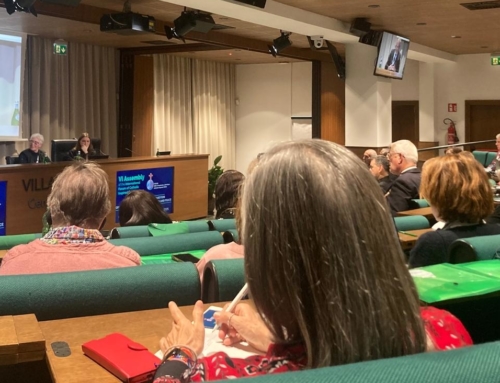FAFCE Board Meeting Resolution : “Subsidiarity, not centralization”
Brussels, the 6th of November 2025
In the current context of demographic transitions, FAFCE calls upon the European Union and its Member States to recognize the essential role of families and family networks, who positively contribute towards social cohesion in Europe, intergenerational solidarity, and overcoming loneliness, besides being also contributors to public finances.
Whilst referring to article 5, §3 of the Treaty of the European Union, which states that “Under the principle of subsidiarity, in areas which do not fall within its exclusive competence, the Union shall act only if and in so far as the objectives of the proposed action cannot be sufficiently achieved by the Member States, either at central level or at regional and local level, but can rather, by reason of the scale or effects of the proposed action, be better achieved at Union level”;
Recalling the principle of subsidiarity, and the role of parents as primary and first educators of their children, confirmed in Article 26 (3) of the Universal Declaration of Human Rights, Article 5 of the UN Convention on the Rights of the Child and Article 2 of the First Protocol to the European Convention of Human Rights;
Recalling the Compendium of the Social Doctrine of the Church, which states that “all societies of a superior order must adopt attitudes of help (“subsidium”) — therefore of support, promotion, development — with respect to lower-order societies. In this way, intermediate social entities can properly perform the functions that fall to them without being required to hand them over unjustly to other social entities of a higher level, by which they would end up being absorbed and substituted, in the end seeing themselves denied their dignity and essential place.”
Recalling that “to ensure future prosperity and wellbeing in the EU, it is crucial to address the challenges brought about by the demographic transition.” (vide Conclusions of the document published by the European Commission entitled “Impact of Demographic change in a changing environment”, 2023, p. 16), and that increasing the fertility rate in the Member States would contribute towards positively resolving the demographic imbalance that is obtaining in various individual Member States.
Considering that the Cohesion Policy is the only instrument by which the European Union is bound to reduce “demographic handicaps” (in art. 174 of the Treaty on the Functioning of the European Union) to achieve the above goal of increasing the fertility rate ;
Recalling the 2021 FAFCE Resolution on “The Family is the Democratic and Demographic Future of Europe”;
Recalling the Encyclical Letter Fratelli Tutti on the “importance of the principle of subsidiarity, which is inseparable from the principle of solidarity”;
Our Federation, whilst it :
- Expresses its concern about the ongoing reform of EU Cohesion Policy which deprives regions and local communities on the repartition of European funds ;
- Stresses that, as the European Commission acknowledges that “Reforms and investments […] help address the economic and fiscal impact of ageing”, these should be considered as investments, while leaving Member States the responsibility to decide on the most effective measures. [Source] ;
- Recalls that a strong cohesion policy will be key to address demographic imbalances and related territorial disparities ;
- Recalls that family policies have lasting effects on the economic and social sustainability of the country and the entire continent, boosting GDP and strengthening European cohesion ;
- Recalls the importance of the action of intermediary bodies within society, such as family networks, to address widespread loneliness, poverty and individualism ;
- Recalls the European Commission and the European Parliament that they are bound by the principle of subsidiarity, which provides for Member States to legislate within their jurisdictions and to respect their right in doing so.”
- Asks the Commission (i) to consider appropriate ways to provide tailored support for regions to successfully manage the demographic, green, digital and industrial challenges as well as (ii) to recognise the non-state actors, such as social enterprises, cooperatives, and third sector organizations, which assume the primary responsibility of structuring family services without new burdens on general taxation, within an ecosystem rooted in local communities and oriented towards the common good, with a special focus on the above challenges ;
- Recalls the subsidiarity principle when it comes to the “primary role and responsibility of parents in the education of their children” as already stated in the FAFCE Board Meeting resolution (October 2021) and recognised in international human rights conventions as stated above;
- Expresses its concern that despite the obligation to apply the subsidiarity principle, European institutions still continue to debate on bioethical matters, such as the life of the unborn and the end of life (abortion and euthanasia), and parenthood and all that these entail and euthanasia fall outside the European Union’s direct competencies ;
- Invites the EU Commission to reconsider the role of regions, and local communities in the reform of the EU Cohesion Policy, and supports the efforts suggested by European Commissioner for Cohesion Policy to improve the management of EU public funding;
- Calls upon the European Commission to engage a wide consultation of civil society, regional and local authorities to determine the best level of power to achieve the reduction of demographic imbalances ;
Conclusion :
FAFCE calls upon the European Commission to take such action and measures so as to revitalize community cohesion, as desired by the founding fathers of a United Europe, whilst respecting the principle of solidarity, and recognizing family and demographic policies as a true “golden rule of accounting” and “fair and stable growth can only be achieved by increasing family well-being, strengthening local communities, and promoting a truly social economy.”









